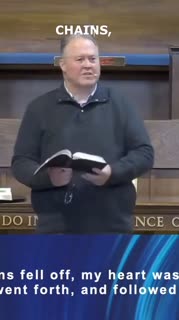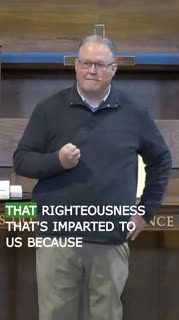Transformative Grace: The Journey of Charles Wesley
Devotional
Sermon Summary
Bible Study Guide
Sermon Clips
Salvation is preposterous, as in it really doesn't make sense. How in the world could a holy, righteous, pure, perfectly good God redeem a sinner like me? How is that possible? It just doesn't make sense. It's unbelievable. [00:06:29] (22 seconds)
It's the love that God gives us even though we don't deserve it. You know, Christianity is the only religion in the world, it's the only philosophy in the world that has any kind of a teaching even close to this idea of grace, this unmerited love. [00:08:58] (16 seconds)
In karma, you get what you deserve. But with grace, Jesus gets what you deserve, and you are offered his unmerited, amazing love. It's his goodness. It's his grace. It's preposterous. It doesn't make sense. [00:09:20] (27 seconds)
You can receive his grace, his love, his salvation. The second P, is personal. Salvation is personal. We know this because God himself exists as three persons who live in the eternal communion of love, the Father, the Son, and the Holy Spirit. [00:10:57] (21 seconds)
He only has children, right? You don't get in on your mom's coattails. You have to receive salvation yourself. It's a personal choice, a personal salvation that's offered to you. And how do you receive it? Well, you receive it through faith. [00:11:47] (17 seconds)
There's nothing you can do to earn it. There's not enough work that can bring you safe to that shore. It's a parachute. You've got to just rest in it. Rest in God's grace. Rest in His love for you. Receive it by faith. Just simply trusting Him. [00:15:39] (28 seconds)
Salvation is powerful. You know, it's not just that you're forgiven of your sins, yes, but it's even more than that. You're forgiven, but also you're freed. You're freed to become the person that God intends you to be in the power and strength of His Holy Spirit. [00:16:25] (20 seconds)
So the chains, the chains that were holding you down, the chains that were tying you to the guilt of your sin have now been released. They've fallen off because of what Jesus has done. And now in the power of the Spirit, I'm able to rise and go and follow Jesus. [00:17:24] (18 seconds)
And just, hear this, this is really important. Just as there's nothing you can do to make God love you less, there's nothing you can do to make God love you more. This isn't earned either. It's just like justification. Salvation. [00:18:16] (27 seconds)
That righteousness that's imparted to us because of Jesus dying on the cross for us. The same power that raised Jesus from the dead is able to raise you to new life in Christ. And it's His doing. It's not your doing. [00:18:41] (16 seconds)
John and Charles Wesley both experienced this life-changing grace, saving and sanctifying grace. And they led this movement called Methodism, which was a revival. A revival that transformed the face of England. [00:20:56] (22 seconds)
Ask a question about this sermon
It's the love that God gives us even though we don't deserve it. You know, Christianity is the only religion in the world, it's the only philosophy in the world that has any kind of a teaching even close to this idea of grace, this unmerited love. [00:08:58] (16 seconds)
In karma, you get what you deserve. But with grace, Jesus gets what you deserve, and you are offered his unmerited, amazing love. It's his goodness. It's his grace. It's preposterous. It doesn't make sense. [00:09:20] (27 seconds)
You can receive his grace, his love, his salvation. The second P, is personal. Salvation is personal. We know this because God himself exists as three persons who live in the eternal communion of love, the Father, the Son, and the Holy Spirit. [00:10:57] (21 seconds)
He only has children, right? You don't get in on your mom's coattails. You have to receive salvation yourself. It's a personal choice, a personal salvation that's offered to you. And how do you receive it? Well, you receive it through faith. [00:11:47] (17 seconds)
There's nothing you can do to earn it. There's not enough work that can bring you safe to that shore. It's a parachute. You've got to just rest in it. Rest in God's grace. Rest in His love for you. Receive it by faith. Just simply trusting Him. [00:15:39] (28 seconds)
Salvation is powerful. You know, it's not just that you're forgiven of your sins, yes, but it's even more than that. You're forgiven, but also you're freed. You're freed to become the person that God intends you to be in the power and strength of His Holy Spirit. [00:16:25] (20 seconds)
So the chains, the chains that were holding you down, the chains that were tying you to the guilt of your sin have now been released. They've fallen off because of what Jesus has done. And now in the power of the Spirit, I'm able to rise and go and follow Jesus. [00:17:24] (18 seconds)
And just, hear this, this is really important. Just as there's nothing you can do to make God love you less, there's nothing you can do to make God love you more. This isn't earned either. It's just like justification. Salvation. [00:18:16] (27 seconds)
That righteousness that's imparted to us because of Jesus dying on the cross for us. The same power that raised Jesus from the dead is able to raise you to new life in Christ. And it's His doing. It's not your doing. [00:18:41] (16 seconds)
John and Charles Wesley both experienced this life-changing grace, saving and sanctifying grace. And they led this movement called Methodism, which was a revival. A revival that transformed the face of England. [00:20:56] (22 seconds)











